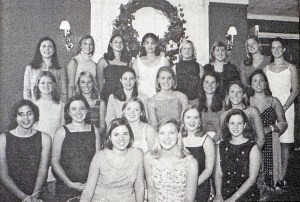Mark Millican: Another battle for post-World War II vets
Published 3:00 pm Tuesday, February 27, 2024

- Mark Millican
After working on U.S. Navy bombers and serving as a gunner during the Pacific campaign of World War II, Aviation Machinist Mate 1st Class Ruly Cecil Smith just wanted to get back home to the family farm in Riceville, Tennessee. He was unaware another battle was brewing in landlocked McMinn County — one he would risk his life to win.
The late Cecil Smith is the father of my wife, Teresa, and every time we hear of a nearby historical presentation on what happened in that area of rural East Tennessee 78 years ago — the Battle of Athens — we’re headed that way. Such was the case a couple of Saturdays ago when the Gilmer County Genealogical Society invited author Tyler L. Boyd to Ellijay to give a presentation on his book “The Biggs Machine: Old Time Politics in Polk County, Tennessee.” Although Boyd’s PowerPoint display hosted by the Gilmer County Library didn’t specifically spotlight the Battle of Athens, he did touch on the subject, as he does in “The Biggs Machine.” For some counties in the rolling foothills and tall mountains of the Volunteer State, the counting of votes away from public view had become “a custom,” according to Boyd: “Voter intimidation and election fraud had become routine in McMinn County, with the perpetrators receiving little to no punishment.”
Trending
And by the end of the war, McMinn County Sheriff Paul Cantrell had built a law enforcement and political dynasty, albeit ignoble. Voting fraud was how he stayed in office. In a family history, Teresa noted the draft board had also become corrupt.
“The powers that had control of the county and the draft board were in opposition to my grandfather’s politics,” she wrote. “Before the war was over, the draft board sent a representative to take another of my grandfather’s sons. He told them to get off his land — he already had two sons serving and he knew the men were only there due to his political opposition to them. Others in the community had sons who weren’t drafted. The draft board men wouldn’t leave, so he shot one of them. He didn’t kill him, but my kind, protective and loving grandfather ended up going to prison. However, they didn’t take any more of his sons. I consider him a hero of the war, too.”
According to “The Biggs Machine,” “… Paul Cantrell’s machine was nothing short of brutal, and had gained unprecedented power in the county. Multiple people were unjustifiably killed by deputies …” By the time World War II veterans began arriving home in late 1945, surely they’d heard in letters, or learned from county residents, about the 1944 killing of a Navy Seabee on leave by a local thug who’d been deputized.
Incensed, returning veterans formed a “GI Ticket” of candidates. Cantrell hired dozens of outside deputies to “keep order” on Election Day, Boyd writes. It was hot on that summer day of Aug. 1, 1946, but it was absolutely scorching by the time the Battle of Athens ignited that afternoon. Cantrell gathered ballot boxes from the county’s largest precincts even before the election was over, intent on taking them to the jail for “safekeeping.” This is where those boxes would be stuffed with fraudulent votes.
“Feeling powerless, McMinn Countians watched as another election was being stolen from them,” continues the author. “But the GIs, especially ex-Marine Bill White, refused to surrender. He told his friends to go home and bring back as many guns as they could find … After fighting the Japanese in the Pacific Theater, this would hardly be a challenge for Bill White.” Shooting between veterans and deputies began in earnest at the jail, for the vets had also raided the town’s armory for additional weapons. However, the old brick structure was quite the fortress, and it was only when veterans began tossing sticks of dynamite at the jail that deputies began giving up. Cantrell had somehow escaped out the back during the battle. During the Q&A session at the library, Teresa revealed that her father had been one of the veterans brandishing and firing a weapon. Yet after the hours-long skirmish ended, my father-in-law who passed away in 2000 — six years before I met his lovely daughter — gave his own blood to one of the wounded “deputies” through an arm-to-arm transfusion. One would think such a sacrifice might go a long way in healing relationships among Tennesseans who were essentially “on the same team.” As Teresa further noted, “The machine did not win the election … My father never mentioned any of this to me during his life. On the contrary, he was always humble and kind and never wanted to brag.” Much of what she learned came from relatives.
As many Americans who lived through that era know, there were deprivations and sacrifices on the home front as the war effort to take on Japan and Germany expanded and intensified. As such, there were also pleas arising from the heartland to the Almighty. My wife’s family history records that one night, her grandmother was awakened and discerned her son Cecil was in great danger. She poured out her heart in prayer, and later he revealed a bomb had gotten loose and was rolling around in the plane’s fuselage, yet did not detonate.
Trending
By the way, Tyler Boyd recommended another book to me: “The Fighting Bunch: The Battle of Athens and How World War II Veterans Won the Only Successful Armed Rebellion Since the Revolution” by Chris DeRose. Don’t tell Teresa and her sister, Debbie, but I’m ordering a couple of autographed copies for them.
Mark Millican is a former staff writer for the Dalton Daily Citizen.





